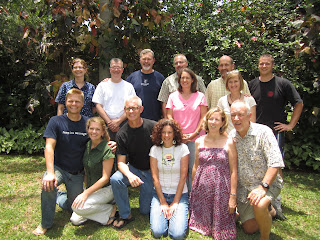One important one that I wanted to write about today (mainly because I have pictures to illustrate the point) is called the transition bridge. We talked extensively at MTI about exiting our home culture and entering into another culture. It is a good thing for us to do, necessary even if we are to effectively minister, but it has its challenges as well, and we were encouraged to recognize our real feelings and emotions during this process. Basically, it will not always be easy, it will not feel natural, it may even feel like...chaos.
To illustrate the point, one day we talked about the transition bridge. This can be useful for anyone facing a change in their lives, not just moving to another culture but things such as starting a new job or school, moving, retiring, etc. You start on one bank of the river: settled. From there you move to unsettled, chaos, resettling, and settled (new). We talked about a variety of thoughts and emotions during this time (excited, nervous, anxious, lost, uncertain, etc). Then we received our practical lesson. A team assembled of two singles and one "family" (mom, dad (Eric volunteered for this), and two kids) were attached together with rock climbing harnesses, ropes, and a telephone cord. They then crossed a "transition bridge." The first stage, settled, was several chairs. Unsettled was two wobbly chairs. Chaos was represented by three exercise balls saran-wrapped together. And then finally, resettling was two wobbly chairs and the new settled was stable chairs. The team all had to cross together.
The "family" in transition. Note that mom and dad's "connection" is quite short/tight comparatively.
The team begins the transition. The two singles are attached to the family by a long telephone cord, meaning the connection is not quite as "rigid" as family ties.
The team as CHAOS begins! There were a number of spotters (supporters) on either side of the bridge to provide a helping hand.
It was fun and all the kids enjoyed this immensely (they had a chance to go over the bridge by themselves at the end). Some lessons learned from the bridge that can be applied to transition in the real world:
1. People on the bridge usually needed help from others during the unsteady "chaos" stage. We will likely need help from supporters, friends and family back home, other missionaries, and nationals so we don't lose our footing during this difficult period. It's tempting to "do it ourselves" but many times we need assistance.
2. The kids tended to hang on to the connection rope between their parents instead of others' hands. Families will likely grow closer during these times of transition if there is a stable relationship between mom and dad. This might result in extra stress/strain/responsibility on the parents as they not only transition themselves, but assist their kids' transitions.
3. Kids can increase the chaos. The little guy in the pictures above, Bryant, started bouncing immediately as he hit the chaos balls. This caused Eric to trip and fall into someone's waiting arms. I guess they sometimes find chaos fun. :)
4. The team might go through transition together, but not everyone will be on the same place of the bridge at the same time. The first teammate made it to resettled as the last teammate was just about to enter chaos...so we need to have patience with our teammates who might not be in the same place as us.
5. Everyone started cheering once the first person was out of chaos...but the resettling stage is still wobbly and can be difficult. We need to remember that transition is a process and might be a long one.
































